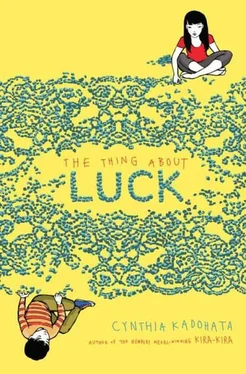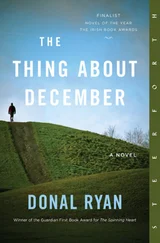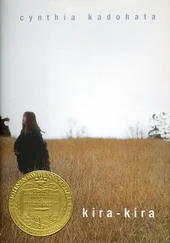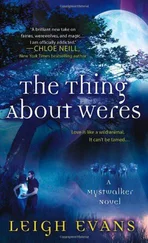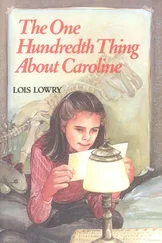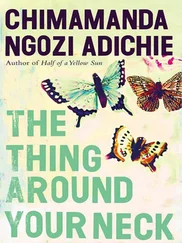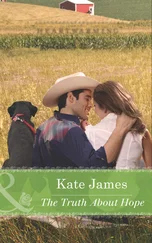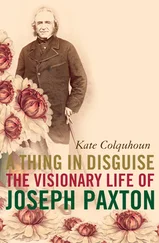Obaachan was squeezing the steering wheel so hard, I thought her beautiful hands might snap.
“Will you be all right?” I asked her.
“It no matter,” she replied simply.
And, unfortunately, I knew that was true. I started to think about the next few months. The last time we’d worked for the Parkers, Mrs. Parker had compiled a binder of every meal with every recipe we were to make. For six days a week at breakfast, the drivers ate just milk and cereal. But on Sundays we made a full-on breakfast—pancakes or French toast or omelettes. We made about 250 meals that year. I swear we followed every recipe exactly, but once in a while Mrs. Parker would wrinkle her forehead and say something like, “Maybe you skimped on the sugar?”
“Hey,” I said suddenly. “How come Jaz doesn’t have a job?”
My grandmother glanced into the rearview mirror. “Summer, you make one more trouble, my head explode and you guilty of murder.”
I started to say that heads don’t explode, but the radio came to life just then, and Mrs. Parker’s voice reported, “It’s already eighty-two degrees in Hargrove.”
That was nothing. One year in Texas the temperature was 110 when we arrived.
Actually, I was kind of relieved that it was going to be a hot day in Hargrove. The things you feared most during harvest were rain and hail and letting the wheat set too long past its prime. But heat was nothing. Once the wheat was ready to harvest, the weather was the boss. After that came the farmer, and close behind were the custom harvesters. The drivers were below them. The cooks were probably even below that, because the drivers could live without us if they had to. Basically, if either the farmer or the Parkers told one of us to do something, we would do it. And me, I was probably at the very bottom of the heap. So even though the Parkers were nice, we weren’t all equals. The Parkers liked to say we were all a family, but that simply wasn’t true.
I took out my mosquito notebook and began to leaf through my drawings, even though it was hard to concentrate in the bumpy truck. I was much better at drawing now than I was at the beginning, but I still wasn’t very good. My secret goal was to make mosquitoes out of real gold and sell them for jewelry. I had made some big mosquitoes out of clay, but the large size didn’t capture their delicacy. It was hard to get the clay thin enough. It always chunked up, and the mosquitoes always looked more like bumblebees. I would have to work on that.
I thought again about how when something almost killed you, you were bonded to it for life. But even during the worst parts of my illness, I knew in my mind that the mosquito hadn’t been trying to kill me. That hadn’t been its goal. It was just trying to get blood so it could lay eggs—only female mosquitoes bite you.
I stopped at one of my favorite drawings, of a mosquito feeding on nectar amid beautiful flowers. I had started that picture seventeen times before I finally got it right. Almost dying makes you think a lot about death. I remember thinking of my family going on without me, of Jaz growing up and being some kind of rocket scientist with exactly two friends, of my mom crying and crying that I was gone. And now I had this second chance at life. My friends all felt like life would go on forever, but I realized it was something happening now . And yet I didn’t know what to make of it. “It’s because your personality hasn’t settled yet,” my mother liked to say, as if my personality was dust floating in water.
I went through every page of my mosquito book. When I looked up, Jaz was sifting through some papers the Parkers had given us. In the mirror, I could see that Obaachan’s face was pale and worried. She was in a lot of pain.
“We’ve got twenty-two jobs,” Jaz said, holding up one of the papers. The Parkers had given everyone a list of the jobs we’d been assigned. “First one’s seven thousand acres.”
“I have to pee,” I said.
“Look in blue bag,” Obaachan replied.
I rummaged through the same bag that held all of Obaachan’s painkillers and spotted a glass jar.
“You’re kidding, right?” I said.
“No kidding. Don’t spill.”
Mrs. Parker had pulled us all over a couple of hours earlier at a truck stop, but I didn’t have to go then. I had to go now. Jaz turned to me, probably to see if I was really going to use the jar. “Mind your own business,” I said. “I decided I don’t have to go that bad.”
The windows were open, the hot air blowing into our faces. I thought about Robbie and made a mental note to rebraid my hair before we stopped again. It was windy out, the wheat field rippling as we passed. It looked less yellow than usual, more like the color of coffee with a whole lot of milk in it. Jiichan had once told me that he knew someone who knew someone who knew someone who knew a woman who could tell your fortune by looking at the way the wind blew the wheat around you. I would be interested in meeting that woman.
A layer of clouds seemed to be pressing down toward us, more like a ceiling than the sky. Despite those clouds, Texas had mostly been dry this year. When the weather was dry while the wheat was growing, the fields would yield fewer bushels per acre. One harvest in Texas, when there had been a lot of rain, the average yield in the state had been nearly sixty bushels an acre, which was quite a lot. This year it would certainly be less—maybe not even thirty.
“Almost there,” Mrs. Parker finally announced over the radio.
I closed the back windows and redid my braids, then sat with sweat dripping down my face. I held up a paper towel to my forehead. “Look what Summer’s doing,” Jaz said.
“I saw,” Obaachan said. “She make saru out of herself for boy.” Saru meant “monkey.” I could not wait to be out of that truck.
The convoy turned down a dirt road where a makeshift sign that read PARKERS TURN HERE was stuck on a tree. When we reached the farm, a man was already standing outside motioning us to park. I got out and saw there were water and electrical hookups. That meant we would be staying on the farm in the campers instead of going to an RV park. It was a lot easier when you stayed on the farm, but I missed the RV parks because there were always other harvester kids there.
As soon as the Parkers’ camper was hooked up, I was going to use the bathroom in there.
Mr. and Mrs. Parker shook the man’s hand. “Mr. Laskey? I’m Lonny Parker. This is my wife, Jenna.”
“Nice to meet you,” Mr. Laskey said. Mr. Laskey was a tall, balding man, and he looked concerned. “I hope you’re ready to hit the ground running. There’s rain forecast for next week.”
“Absolutely. We brought enough machinery this first trip to start right now.”
“Great, great. I want this to be a quick job.” He said that with the slightest hint of warning in his voice, like if it wasn’t a quick job, he would be irate.
“We’ll get your wheat in before then, don’t you worry.” Mr. Parker studied the fields around him and the low clouds. “Those don’t look like rain clouds. Yep, not to worry.”
Mr. Laskey nodded. He stood with his arms crossed in front of him, and he looked impatient. I’d discovered that some farmers were very tense people because nearly their whole earnings for the year depended on how their wheat crop turned out during these few days of harvest. All year they prayed for rain, until harvest came and they prayed for no rain. Some of them were real nice, but others were just plain grumps.
But I got it. The wheat couldn’t be much more than 13.5 percent moist or the grain elevators wouldn’t accept it. Wheat that was too moist could cause fungus. The combines had instruments to measure the wheat’s moisture content, and there were handheld gadgets to measure with as well. The Parkers used a moisture meter that looked like a thermos cup. You would fill it with wheat, and it would tell you what the moisture level was.
Читать дальше
